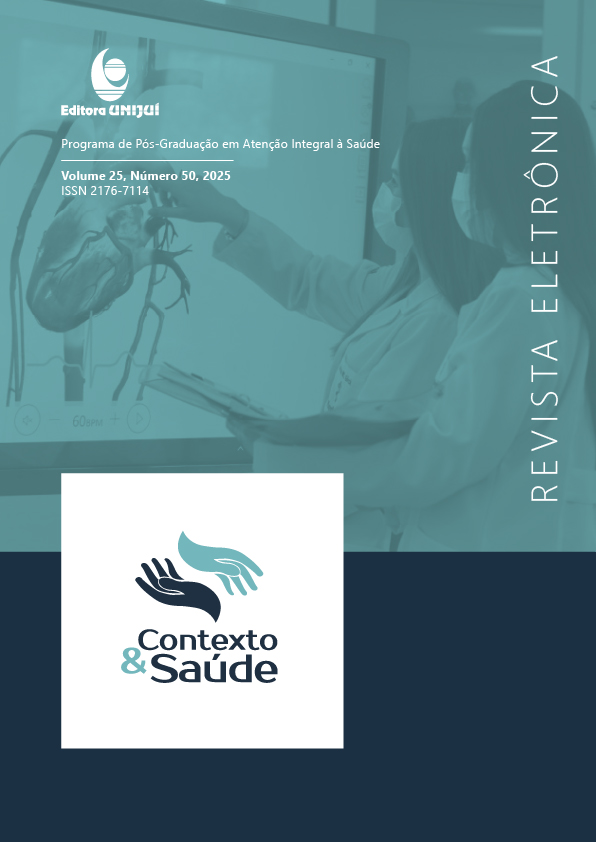Health literacy of nursing students
DOI:
https://doi.org/10.21527/2176-7114.2025.50.15313Keywords:
Health literacy, Nursing students, Health educationAbstract
Objective: To identify health literacy among nursing undergraduates in their final year of undergraduate studies. Method: This is a cross-sectional study with descriptive analysis and a quantitative approach, using the Health Literacy Questionnaire instrument with nursing undergraduates in the 9th and 10th semesters, between 18 and 60 years old, of both sexes, at a private educational institution in the Federal District. The sample included 67 participants who agreed to participate in the study. Results: The study indicates that more than half of nursing undergraduates are female, have not taken a technical course and are up to 40 years old. The ability to find good information about health and understand it stands out among the potentialities in health literacy, while poor time management for self-care stands out among the weaknesses. Conclusion: This study presents evidence about the health literacy conditions of undergraduates who will be a source of knowledge for different populations in the future due to their understanding and mastery of health literacy. This enables research into new interventions in the academic environment aiming at both professional and educational improvement. A more comprehensive health system with more qualified professionals is essential.
References
1. Maragno CAD, Mengue SS, Moraes CG, Rebelo MVD, Guimarães AM, Dal Pizzol TS. Teste de letramento em saúde em português para adultos. Rev Bras Epidemiol. 2019;22. doi:10.1590/1980-549720190025. Disponível em: https://www.scielo.br/j/rbepid/a/kzZkT67nn6S7rfSxW8nRSLp/abstract/?lang=pt
2. Carvalho IAM, Silva TM, Cecilio HPM, Arruda GO, Teston EF, Marcon SS. Concordância entre dois instrumentos para avaliação do letramento em saúde. Rev Bras Epidemiol. 2020;23 . doi:10.1590/1980-549720200077. Disponível em: https://www.scielo.br/j/ress/a/ZnYf5TzXZhGgfXzKZBQ3xgd/
3. Passamai MPB, Sampaio HAC, Dias AMI, Cabral LA. Letramento funcional em saúde: reflexões e conceitos sobre seu impacto na interação entre usuários, profissionais e sistema de saúde. Interface (Botucatu). 2012;16(41):301-14. doi:10.1590/S1414-32832012005000027. Disponível em: https://www.scielo.br/j/icse/a/yWprLXc57D8G4jM5DpVH68c/abstract/?lang=pt
4. Costa JA, Nogueira LT. Fatores associados ao letramento funcional em saúde de mulheres atendidas pela Estratégia de Saúde da Família. Cad Saúde Colet. 2019;27(3):268-74. doi:10.1590/1414-462X201900030081. Disponível em: https://www.scielo.br/j/cadsc/a/f4M3FCYvdLYJ6RVGMqSyHQb/?lang=pt
5. Morris RL, Soh SE, Hill KD, Buchbinder R, Lowthian JA, Redfern J, et al. The relationship between health literacy and quality of life among frequent users of health care services: a cross-sectional study. BMC Health Serv Res. 2017;17(1):485. doi:10.1186/s12913-017-2406-2. Disponível em: https://pubmed.ncbi.nlm.nih.gov/28683743/
6. Panelli BL, et al. “Promotores da saúde” em um assentamento rural: letramento em saúde como intervenção comunitária. Textos Contextos (Porto Alegre). 2020;19(1) Disponível em: https://revistaseletronicas.pucrs.br/ojs/index.php/fass/article/view/29470/26280
7. Silva AGI, Cordeiro DL, Mendonça JM, Sousa LA, Pereira ML. Letramento funcional em saúde de idosos hipertensos e diabéticos atendidos na Estratégia Saúde da Família. Esc Anna Nery [Internet]. 2023 [cited 2024 Nov 13];27 Disponível em: https://www.scielo.br/j/ean/a/YtLvghq34knPc5DZJThGbcR/
8. Souza MHT, Azevedo IC, Dias IM, Reiners AAO, Zem-Mascarenhas SH, Andrade MS. Validação do Health Literacy Questionnaire (HLQ) para o português brasileiro. Acta Paul Enferm [Internet]. 2023 [cited 2024 Nov 13];36 Disponível em: https://www.scielo.br/j/ape/a/XC8t5yGWj7f78vLjt3QWRyL/
9. Osborne RH, Batterham RW, Elsworth GR, Hawkins M, Buchbinder R. The grounded psychometric development and initial validation of the Health Literacy Questionnaire (HLQ). BMC Public Health. 2013;13:658. doi:10.1186/1471-2458-13-658. Disponível em: https://bmcpublichealth.biomedcentral.com/articles/10.1186/1471-2458-13-658
10. Canal D, Suñer-Soler R, Boixadós Porquet A, Vernay M, Blanchard H, Bertran-Noguer C. Health literacy among health and social care university students. Int J Environ Res Public Health [Internet]. 2020;17(7):2273. Disponível em: http://dx.doi.org/10.3390/ijerph17072273
11. Maluka C, Dube K. Nursing students’ understanding of health literacy and health practices: a cross-sectional study at a university in Namibia. BMC Nurs [Internet]. 2021;20(1):76. Disponível em: http://dx.doi.org/10.1186/s12912-021-00776-z
12. Vaz De Almeida C, Moraes L, Brasil K. 50 Técnicas: Literacia em Saúde na Prática. 2020.
13. Akca A, Ayaz-Alkaya S. Effectiveness of health literacy education for nursing students: A randomized controlled trial. Int J Nurs Pract [Internet]. 2021;27(5). Disponível em: http://dx.doi.org/10.1111/ijn.12981
14. Peres F, Rodrigues KM, Silva TL, et al. Literacia em Saúde. Rio de Janeiro: Editora FIOCRUZ; 2021.
15. Storey A, Hanna L, Missen K, Hakman N, Osborne RH, Beauchamp A. The association between health literacy and self-rated health amongst Australian university students. J Health Commun [Internet]. 2020 [cited 2023 Oct 31];25(4):333–43. Disponível em: https://pubmed.ncbi.nlm.nih.gov/32419661/
16. Rababah JA, Al-Hammouri MM. Health literacy and smoking habits among a sample of Jordanian university students. J Community Health [Internet]. 2023;48(1):30–7. Disponível em: http://dx.doi.org/10.1007/s10900-022-01139-8
Downloads
Published
How to Cite
Issue
Section
License
Copyright (c) 2025 Context and Health Journal

This work is licensed under a Creative Commons Attribution 4.0 International License.
By publishing in Revista Contexto & Saúde, authors agree to the following terms:
The works are licensed under the Creative Commons Atribuição 4.0 Internacional (CC BY 4.0) license, which allows:
Share — to copy and redistribute the material in any medium or format;
Adapt — to remix, transform, and build upon the material for any purpose, including commercial.
These permissions are irrevocable, provided that the following terms are respected:
Attribution — authors must be properly credited, with a link to the license and indication of any changes made.
No additional restrictions — no legal or technological measures may be applied that restrict the use permitted by the license.
Notes:
The license does not apply to elements in the public domain or covered by legal exceptions.
The license does not grant all rights necessary for specific uses (e.g., image rights, privacy, or moral rights).
The journal is not responsible for opinions expressed in the articles, which are the sole responsibility of the authors. The Editor, with the support of the Editorial Board, reserves the right to suggest or request modifications when necessary.
Only original scientific articles presenting research results of interest that have not been published or simultaneously submitted to another journal with the same objective will be accepted.
Mentions of trademarks or specific products are intended solely for identification purposes, without any promotional association by the authors or the journal.
License Agreement (for articles published from September 2025): Authors retain copyright over their article and grant Revista Contexto & Saúde the right of first publication.

